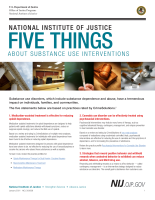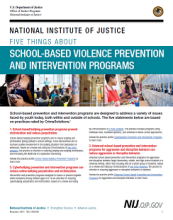Intervention
A School-Based Program to Prevent Adolescent Dating Violence
Brief Intervention for Heavy-Drinking College Students: 4-Year Follow-Up and Natural History
An Acute Post-Rape Intervention to Prevent Substance Use and Abuse
A Teacher-Delivered Intervention for Adolescents Exposed to Ongoing and Intense Traumatic War-Related Stress: A Quasi-Randomized Controlled Study
An Informal School-Based Peer-Led Intervention for Smoking Prevention in Adolescence (ASSIST): A Cluster Randomised Trial
License Plate Reader (LPR) Police Patrols in Crime Hot Spots: An Experimental Evaluation in Two Adjacent Jurisdictions
Implementing Youth Violence Reduction Strategies: Findings from a Scan of Youth Gun, Group, and Gang Violence Interventions
Multilevel Evaluation of Project Safe Neighborhoods
Project Safe Neighborhoods (PSN) is a DOJ-sponsored initiative to reduce violent crime, particularly gun crime, by fostering cooperation by criminal justice agencies and local partners to develop and implement strategic approaches.
See the YouTube Terms of Service and Google Privacy Policy
NIJ-Funded Research on Mass Shootings to Advance Evidence-Based Policy and Practice
Mass public shootings continue to threaten communities in the United States, yet research on this criminal phenomenon is limited. In this full thematic panel, renowned experts will present a series of research projects summarizing NIJ-funded research projects’ newest findings on public mass shootings. The discussion will focus on NIJ’s investment to address the phenomenon of mass shootings through innovative study approaches to advance our understanding of mass shootings and inform prevention efforts. The implications of this research to criminal justice will also be discussed.
See the YouTube Terms of Service and Google Privacy Policy
Five Things About Substance Use Interventions
NIJ-Funded Research on Firearms Violence in Urban Cities Advancing Scientific Evidence to Inform Practice
In this full thematic panel, renowned experts will present a series of papers summarizing the newest findings of NIJ-funded research projects on criminal offenses with firearms in urban areas. Researchers used various criminological and other theories, including routine activity theory, socio-ecological and socio-environmental perspectives, and advanced mixed-study methods, including surveys and spatio-temporal designs, to produce scientific evidence to inform practice.
See the YouTube Terms of Service and Google Privacy Policy
Desistance From Crime: Implications for Research, Policy, and Practice
Most scholars would agree that desistance from crime – the process of ceasing engagement in criminal activities – is normative. However, there is variability in the literature regarding the definition and measurement of desistance, the signals of desistance, the age at which desistance begins, and the underlying mechanisms that lead to desistance. Even with considerable advances in the theoretical understanding of desistance from crime, there remain critical gaps between research and the application of that research to practice.
See the YouTube Terms of Service and Google Privacy Policy
Five Things About School-Based Violence Prevention and Intervention Programs
Webinar Transcript: W.E.B. Du Bois Program of Research on Reducing Racial and Ethnic Disparities in the Justice System, Fiscal Year 2021
Following is a transcript of a webinar hosted by NIJ in support of the funding opportunity "W.E.B. Du Bois Program of Research on Reducing Racial and Ethnic Disparities in the Justice System, Fiscal Year 2021."
DARYL FOX: Good afternoon, everyone, and welcome to today’s webinar, Funding Opportunities Through NIJ, the W.E.B. Du Bois Program of Research on Reducing Racial and Ethnic Disparities in...





